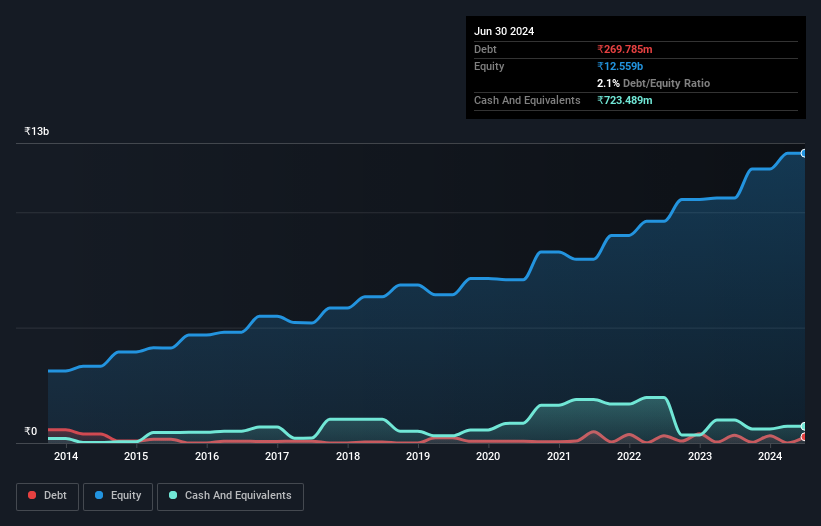Dhanuka Agritech (NSE:DHANUKA) Has A Pretty Healthy Balance Sheet
Legendary fund manager Li Lu (who Charlie Munger backed) once said, 'The biggest investment risk is not the volatility of prices, but whether you will suffer a permanent loss of capital.' When we think about how risky a company is, we always like to look at its use of debt, since debt overload can lead to ruin. We can see that Dhanuka Agritech Limited (NSE:DHANUKA) does use debt in its business. But should shareholders be worried about its use of debt?
Why Does Debt Bring Risk?
Debt and other liabilities become risky for a business when it cannot easily fulfill those obligations, either with free cash flow or by raising capital at an attractive price. Ultimately, if the company can't fulfill its legal obligations to repay debt, shareholders could walk away with nothing. However, a more usual (but still expensive) situation is where a company must dilute shareholders at a cheap share price simply to get debt under control. Of course, plenty of companies use debt to fund growth, without any negative consequences. When we examine debt levels, we first consider both cash and debt levels, together.
See our latest analysis for Dhanuka Agritech
What Is Dhanuka Agritech's Net Debt?
As you can see below, Dhanuka Agritech had ₹269.8m of debt at March 2024, down from ₹335.2m a year prior. However, its balance sheet shows it holds ₹723.5m in cash, so it actually has ₹453.7m net cash.

How Healthy Is Dhanuka Agritech's Balance Sheet?
We can see from the most recent balance sheet that Dhanuka Agritech had liabilities of ₹2.78b falling due within a year, and liabilities of ₹451.2m due beyond that. On the other hand, it had cash of ₹723.5m and ₹5.01b worth of receivables due within a year. So it can boast ₹2.50b more liquid assets than total liabilities.
This surplus suggests that Dhanuka Agritech has a conservative balance sheet, and could probably eliminate its debt without much difficulty. Succinctly put, Dhanuka Agritech boasts net cash, so it's fair to say it does not have a heavy debt load!
Also good is that Dhanuka Agritech grew its EBIT at 19% over the last year, further increasing its ability to manage debt. The balance sheet is clearly the area to focus on when you are analysing debt. But it is future earnings, more than anything, that will determine Dhanuka Agritech's ability to maintain a healthy balance sheet going forward. So if you're focused on the future you can check out this free report showing analyst profit forecasts.
Finally, a company can only pay off debt with cold hard cash, not accounting profits. While Dhanuka Agritech has net cash on its balance sheet, it's still worth taking a look at its ability to convert earnings before interest and tax (EBIT) to free cash flow, to help us understand how quickly it is building (or eroding) that cash balance. In the last three years, Dhanuka Agritech created free cash flow amounting to 12% of its EBIT, an uninspiring performance. For us, cash conversion that low sparks a little paranoia about is ability to extinguish debt.
Summing Up
While it is always sensible to investigate a company's debt, in this case Dhanuka Agritech has ₹453.7m in net cash and a decent-looking balance sheet. And it impressed us with its EBIT growth of 19% over the last year. So we are not troubled with Dhanuka Agritech's debt use. There's no doubt that we learn most about debt from the balance sheet. However, not all investment risk resides within the balance sheet - far from it. For example, we've discovered 1 warning sign for Dhanuka Agritech that you should be aware of before investing here.
At the end of the day, it's often better to focus on companies that are free from net debt. You can access our special list of such companies (all with a track record of profit growth). It's free.
New: Manage All Your Stock Portfolios in One Place
We've created the ultimate portfolio companion for stock investors, and it's free.
• Connect an unlimited number of Portfolios and see your total in one currency
• Be alerted to new Warning Signs or Risks via email or mobile
• Track the Fair Value of your stocks
Have feedback on this article? Concerned about the content? Get in touch with us directly. Alternatively, email editorial-team (at) simplywallst.com.
This article by Simply Wall St is general in nature. We provide commentary based on historical data and analyst forecasts only using an unbiased methodology and our articles are not intended to be financial advice. It does not constitute a recommendation to buy or sell any stock, and does not take account of your objectives, or your financial situation. We aim to bring you long-term focused analysis driven by fundamental data. Note that our analysis may not factor in the latest price-sensitive company announcements or qualitative material. Simply Wall St has no position in any stocks mentioned.
About NSEI:DHANUKA
Outstanding track record with excellent balance sheet.
Similar Companies
Market Insights
Community Narratives





